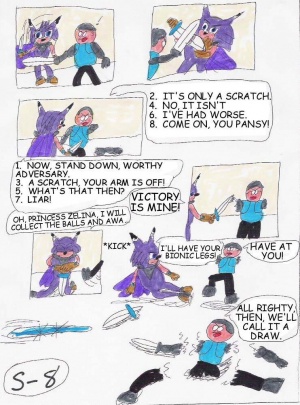Difference between revisions of "Monty Python"
| Line 13: | Line 13: | ||
Chris seems to have developed the notion that Monty Python involves putting something idiotic in a situation and this will make the scene funny. The fact that he believes this and makes it the basis of his random-access humor shows that he has little to no understanding of the finer facets of the show. | Chris seems to have developed the notion that Monty Python involves putting something idiotic in a situation and this will make the scene funny. The fact that he believes this and makes it the basis of his random-access humor shows that he has little to no understanding of the finer facets of the show. | ||
While not exactly highbrow, the show is quite masterful in its comedic devices. If we look at some of the more famous sketches such as [http://people.csail.mit.edu/paulfitz/spanish/script.html The Spanish Inquisition], we see how the Monty Python crew start with what seems to be a humorous scene about jargon and a muffling accent is suddenly interrupted by a troupe of medieval clergymen who seek to extract confessions. All this deriving from the use of a language idiom in the beginning of what seemed to be a completely different scene. This is followed by increasingly more absurdist humor based on the | While not always exactly highbrow or remotely esoteric, the show is quite masterful in its comedic devices. If we look at some of the more famous sketches such as [http://people.csail.mit.edu/paulfitz/spanish/script.html The Spanish Inquisition], we see how the Monty Python crew start with what seems to be a humorous scene about jargon and a muffling accent is suddenly interrupted by a troupe of medieval clergymen who seek to extract confessions. All this deriving from the use of a language idiom in the beginning of what seemed to be a completely different scene. This is followed by increasingly more absurdist humor based on the Inquisition members. | ||
The formula of a normal situation which has become funny in its own right followed by absurdist humor coming directly out of the use of an idiom is totally lost on Chris. Instead he sees it as SOMEONE SHOUTED SOMETHING RANDOM, IT MUST BE FUNNY. | The formula of a normal situation which has become funny in its own right followed by absurdist humor coming directly out of the use of an idiom is totally lost on Chris. Instead he sees it as SOMEONE SHOUTED SOMETHING RANDOM, IT MUST BE FUNNY. | ||
Revision as of 14:53, 4 November 2009
| “ | ...And now for somecuppitydifferent! | ” |
| Chris, trying to quote Monty Python through flapping aspie lips | ||
Monty Python is a British comedy troupe formed in the late 1960s by Graham Chapman, John Cleese, Terry Gilliam, Eric Idle, Terry Jones, and Michael Palin. They created the popular comedy sketch show Monty Python's Flying Circus which ran for five years on BBC2, becoming a phenomenon in Great Britain and later developing a strong cult following in the United States as well. The troupe followed up the TV show by producing three feature films, including the classic Monty Python and the Holy Grail.
Chris is a fan of the Monty Python comedy productions -- he's bought almost $50 worth of Python videos through his PlayStation Network account -- and as is the case with every other form of entertainment he enjoys, he views them as an excellent source of material to steal for his own comics and videos. Due to a minor cultural barrier, he probably doesn't even understand more than half the jokes.
The show's sense of humor is difficult to categorize. It combines satire, surrealism, cultural references, the deft use of non sequitur, and liberal doses of vulgarity that often made it controversial in its time. One way to define the Python style of comedy, though, might be this: imagine if Chris's infamous random-access humor were actually somehow made funny.
Chris's interpretation

Chris seems to have developed the notion that Monty Python involves putting something idiotic in a situation and this will make the scene funny. The fact that he believes this and makes it the basis of his random-access humor shows that he has little to no understanding of the finer facets of the show.
While not always exactly highbrow or remotely esoteric, the show is quite masterful in its comedic devices. If we look at some of the more famous sketches such as The Spanish Inquisition, we see how the Monty Python crew start with what seems to be a humorous scene about jargon and a muffling accent is suddenly interrupted by a troupe of medieval clergymen who seek to extract confessions. All this deriving from the use of a language idiom in the beginning of what seemed to be a completely different scene. This is followed by increasingly more absurdist humor based on the Inquisition members.
The formula of a normal situation which has become funny in its own right followed by absurdist humor coming directly out of the use of an idiom is totally lost on Chris. Instead he sees it as SOMEONE SHOUTED SOMETHING RANDOM, IT MUST BE FUNNY.
Even the phrase "...And now for something completely different" that Chris has borrowed ripped off completely mispronounced and massacred was used in the original sketches as a way to lead into new material, but remained ironic because the segue itself was completely different from the previous sketch. Instead Chris merely uses it to introduce more of his bullshit.
Attempts to be Pythonesque
If CWCFlyingElephants is to be our guide to how Chris thinks Monty Python humor is constructed, then we are to believe that things can be funny by skipping around to several random clips with no set-up or basis (while naked no less). To top it off, Chris throws in bits of completely unrelated material from other comedy shows that have humor completely different from Monty Python such as South Park and Ed, Edd n Eddy. The fact that these programs are all known for their own unique varieties of humor doesn't stop Chris from mashing them together in a retarded fashion that he thinks represents Monty Python.
In addition to not involving proper set-up, planning and generally anything clever to the comedy process, Chris also fails to realise that one character having dialogue is confusing. Whereas Monty Python will have either funny monologues related to one topic or derive humor from juxtaposing absurd with the normal, Chris just carries on a conversation with himself and loses all nuances of setting and context.
Actual ripoffs
Gags Chris has ripped from Python TV sketches and movies include:
- The catchphrase "...And now for something completely different" (or "somecummpentydifferent" as Chris mispronounces it). This was a running gag on the Python TV shows, part punch line and part segue. It would usually signal the end of a short bit of surreal imagery and lead into something new. In Chris's case, it's a sign that he's about to randomly access something "humorous." See CWCFlyingElephants.
- Darkbind Sonichu's fight with the Merried Seinor Comic in Sonichu 3. This is an almost word-for-word imitation of Graham Chapman/King Arthur's battle with the Black Knight in Monty Python and the Holy Grail.
- The hedgehog that steals Jimmy Hill's teeth in Sonichu 10. He originally appeared in the "Piranha Brothers" sketch, where he was named "Spiny Norman," although he never showed any particular interest in false teeth. (Chris probably just fixates on anything hedgehog-related. He's obviously failing at both violence and sarcasm.)



